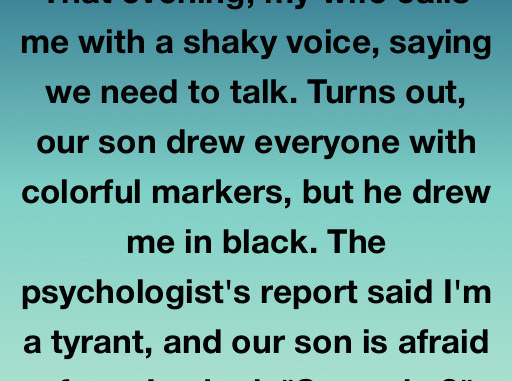
It started with a simple preschool art project.
That evening, my wife, Ana, called me, her voice trembling.
“We need to talk.”
Our son, Luca, had drawn his family with bright, colorful markers.
Everyone was vibrant.
Happy.
Full of life.
Except for me.
I was drawn in solid black.
The school sent the drawing to a psychologist.
The report came back: “Father appears authoritarian. Child may be fearful.”
Ana looked at me like I was a stranger.
Maybe even a threat.
And honestly?
I didn’t blame her.
How could I?
That night, I sat on the couch, heart heavy.
Luca came over, tugged my sleeve.
“Did I make you sad, Daddy?”
I pulled him close.
“No, buddy. Just thinking.”
Later, I asked him, voice quiet:
“Why did you draw me in black?”
He looked up, completely serious.
“Because black means strong.
You’re the strongest, Daddy.”
I felt something break inside me.
Not in a bad way.
In a waking up way.
He didn’t see me as scary.
Not as cold.
Not as a tyrant.
He saw me as strong.
And I had been so busy trying not to be like my father — a man who ruled with silence and discipline — that I hadn’t realized I’d become a version of him anyway.
Strict.
Distant.
Always correcting.
Always in control.
I never raised my voice.
Never laid a hand on him.
But maybe my presence was heavy enough.
That night, I talked to Ana.
No excuses.
No deflection.
Just truth.
I admitted I’d been carrying work stress home.
That I’d been slipping into old patterns without realizing it.
That I wanted to be better — I just didn’t know how.
She didn’t yell.
She didn’t cry.
She just listened.
And when she went to bed, I stayed up, holding Luca as he slept in my lap, wondering how a single crayon could reveal so much.
The next morning, I made pancakes.
Burnt the first batch.
Luca laughed so hard he snorted.
Ana watched from the doorway — her eyes soft, curious.
That became the start.
Small changes.
No grand gestures.
Just presence.
Instead of “Do this now,” I said, “Want to build something together?”
Instead of fixing his mistakes, I let him fix them.
We started walking every evening — counting dogs, naming stars, inventing stories about dinosaurs in the clouds.
One night, we passed a house with a giant black skeleton still hanging in the tree — a leftover Halloween decoration.
“Daddy,” Luca said, pointing, “black can be funny too.”
I laughed. “You’re right. It can.”
Ana noticed the shift.
She didn’t say much.
But one Saturday, I caught her taking a photo of us — asleep on the floor, buried in Legos.
She didn’t delete it.
She kept it.
Weeks passed.
Then months.
When the preschool invited dads to speak about their jobs, I almost said no.
I wasn’t a firefighter.
I wasn’t a superhero.
I managed logistics.
But Ana said, “Go. You’ve come a long way.”
So I did.
I stood in front of a room of squirming kids, fumbling through my speech.
Then Luca raised his hand.
“Can I tell them about my dad?”
The teacher smiled. “Of course.”
“He helps trucks find their way,” he said proudly.
“And he makes pancakes. And he built a birdhouse that looks funny, but it’s still cool.
He’s really strong… but not scary anymore.”
The room clapped.
My throat tightened.
For the first time in years, I didn’t feel like I was failing.
I felt seen.
Afterward, Ana hugged me — tighter than she had in months.
“You’re doing it,” she whispered.
“You’re showing up.”
It wasn’t perfect.
I still had bad days.
Days I came home tired, quiet, distant.
But now, I’d say, “I’m sorry. Dad’s having a hard day. But I still love you.”
And Luca would say, “It’s okay. We’ll build Legos tomorrow.”
Then, one afternoon, while cleaning the closet, I found a drawing.
Newer.
Brighter.
All the family in color.
And me?
Drawn in gold.
I showed it to Ana.
She kissed my cheek.
“That’s who you are to him now,” she said.
“Not just strong.
Special.”
But life wasn’t done teaching us.
One October morning, Ana collapsed.
Tests revealed a tumor — early stage, treatable, but serious.
The surgery day was the longest of my life.
Luca and I sat in the waiting room, hands locked.
“Is Mommy gonna be okay?” he asked.
I knelt, cupped his face.
“Yes. Because we’re going to be strong — together.”
She made it through.
Recovery was slow.
But Luca became her little nurse — bringing water, reading stories, even trying to make pancakes.
(He burnt them. We ate them anyway.)
That winter, we visited her parents.
Snow everywhere.
Luca built a snowman — gave it a paper tie “so it looks like Daddy at work.”
Ana laughed until she cried.
That night, by the fire, she took my hand.
“You changed our whole story,” she said.
I shook my head.
“I just listened to our son.”
She smiled.
“Exactly.”
Taller. Deeper voice.
But still my boy.
After the ceremony, he hugged me, slipped an envelope into my hand.
Inside was a photo.
The original drawing.
Me — in black.
And behind it, a note in his handwriting:
“Thanks for turning the black into gold.”
That night, I stood by the window, looking at the stars, heart full.
Because here’s what I learned:
The darkest parts of us aren’t always evil.
Sometimes, they’re just shadows —
from a past we didn’t escape.
But if we listen — really listen —
we can step into the light.
So if you’re reading this, and you’ve ever felt like you’re the “black figure” in someone’s life…
It’s not too late.
You can change the story.
One day.
One choice.
One word at a time.
And who knows?
You might just become someone’s gold.